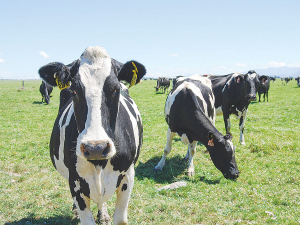South Island dairy production lifts despite stormy summer, feed risks loom
South Island dairy production is up on last year despite an unusually wet, dull and stormy summer, says DairyNZ lower South Island regional manager Jared Stockman.
 A recent study shows that animals 'personality' is distinctly linked to productivity traits in cattle.
A recent study shows that animals 'personality' is distinctly linked to productivity traits in cattle.
A recently published Journal of Dairy Science article puts forth evidence that animal personality is distinctly linked to productivity traits in cattle and farm animals in general.
In the study, carried out at Lincoln University, 87 cows were exposed twice to five different behavioural tests. Responses to novel or stressful situations were scored on a ranked scale of investigative and reactive behaviour, with most test scores being consistent over repeated tests. Behaviour test scores were subjected to a principal components analysis that revealed relationships between tests in three factors (fear of human, curiosity and reaction to milking) interpreted as personality traits.
The results were interesting, with some findings being quite expected, such as cows that are surliers and more reactive producing less milk than cows that are calm at milking. However, others were less easily predicted; less sociable beef cows often initiated herd movements to new forage sites after periods of rest.
In general, the findings showed that calmer, more curious cows spent more time grazing and less time lying down. They were also less distributed by changes to environment.
However, as an interesting exception, grain fed calves with greater avoidance of novel objects and humans reached weaning criteria earlier.
Independent of this study yet coming to similar findings, a Brazilian university study found that surly, temperamental cows were 40% less efficient at metabolising methane than calm cows leading to increased emissions per kg of milk produced.
Although the Journal article says that the testing methodology is time and space consuming, limiting the opportunity for commercial farms to use personality tests. AgResearch told Rural News that it has been testing the methodology across the country and has found that the challenges are not insurmountable.
"Running a few personality tests requires the farmer to be flexible, with one or two milkings taking longer," AgResearch senior scientist Gosia Zobel explains. "We found that test responses were consistent between testing occasions, so in theory the tests could be deployed just once a year."
She says that although cows having personalities was no surprise, the amount of variation in responses to the behavioural tests was.
While many may see this research as pointless or even comical, it may prove to have multiple uses. By breeding cattle with certain psychological traits, farmers may produce animals that provide more milk, or those with placid temperaments making them less likely to spook and increasing growth rates through lower stress.
"To actually manage animals with sentience in mind means we need a greater acceptance of the individual animal," Zobel adds. "Developing ways to work with the various differences in individual behaviour is important to moving the country forward."
The World Wide Sires National All Day Breeds Best Youth Camp Best All Rounder plaudit has become family affair, with 2026 Paramount Cup winner Holly Williams following in her sister Zara's footsteps.
DairyNZ is giving New Zealand farmers a unique opportunity to gain hands-on governance and leadership experience within the dairy sector.
Herd improvement company LIC has posted a 5.2% lift in half-year revenue, thanks to increasing demand for genetics.
According to the latest Fresh Produce Trend Report from United Fresh, 2026 will be a year where fruit and vegetables are shaped by cost pressures, rapid digital adoption, and a renewed focus on wellbeing at home.
The Roar is a highlight of the game hunting calendar in New Zealand, with thousands of hunters set to head for the hills to hunt male stags during March and April.
OPINION: The past few weeks have been tough on farms across the North Island: floods and storms have caused damage and disruption to families and businesses.

OPINION: Meanwhile, red blooded Northland politician Matua Shane Jones has provided one of the most telling quotes of the year…
OPINION: This old mutt has been around for a few years now and it seems these ‘once in 100-year’ weather…